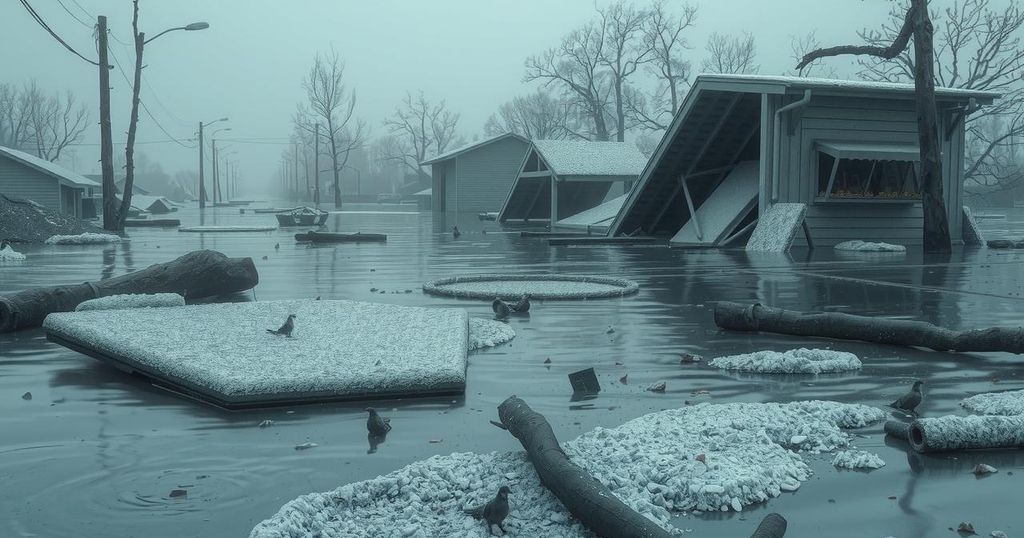Community in Niger Battles Decaying Stench After Deadly Flooding
In Mokwa Local Government Area, residents are troubled by the stench of decaying corpses nearly two weeks after devastating floods. Approximately 200 people drowned, with many bodies still missing. Local residents express urgent health concerns, appealing for government assistance amid ongoing recovery efforts and significant donations from federal and state authorities.
In the wake of catastrophic flooding that struck Mokwa Local Government Area in Niger State nearly two weeks ago, residents are grappling with the troubling odor of decaying bodies believed to still be trapped beneath sand and debris. The overwhelming stench serves as a painful reminder of the tragedy, posing serious health risks to the community. Days marked by heavy rain on May 28 and 29 resulted in the drowning of approximately 200 people, marking a dark chapter for the local populace.
According to reports from the Niger State Emergency Management Agency (NSEMA), over 50 homes and their residents were swept away by the floodwaters, displacing more than 3,000 individuals and impacting 503 households. Among the grim statistics, the agency has confirmed 161 bodies have been recovered, though many other victims remain unaccounted for. The grim aftermath of the flooding has left the community to deal with both loss and the ongoing threat posed by the lingering odor.
Residents like Esther Nwanosike voiced their concerns regarding the health implications tied to the fetid air. “I sell food in a makeshift shop. The smell is overwhelming, and I am concerned about the potential health implications,” she told The PUNCH. Nwanosike said the stench worsens with the wind, making it intolerable for her and her customers. Another local, Alhassan Kolo, expressed similar distress, stating that some bodies, now unrecognizable due to decay, complicate recovery efforts.
“Honestly, some of the bodies we recovered, you can’t even recognise them anymore because they are decaying,” Kolo explained. As recovery teams continue to sift through the debris, residents express fears that the number of missing persons may still be high. Ahmed Yusuf, another concerned citizen, shared his frustration about the pervasive smell, adding urgency to calls for government intervention.
Many displaced individuals have refused to stay in government-run camps, with residents like Salihu Ishaq recounting personal losses from the flood. “This incident is very disastrous because we didn’t expect it,” Ishaq lamented. The sadness is palpable, as families search for loved ones who may not return. Vice President Kashim Shettima, visiting the area, announced a significant aid package for rehabilitation and recovery, including a N2 billion contribution on the federal level.
Adding to that, the state government announced an additional N1 billion for victim support. Amina Abubakar, who has been desperately searching for her sister and her three children, appealed for immediate government assistance. “Most people have lost everything and don’t know where to start. The government should come in immediately; it is very urgent,” she stated, reflecting the desperate situation.
Idris Ibrahim, the Director of Public Health in the Ministry of Secondary and Tertiary Health, assured the public that efforts are underway to address the stench and the recovery process. “We are doing something about it. A prevention control team is there and officials are working round the clock to ensure that the smell issue is addressed,” he said.
Meanwhile, the spokesperson for the NSEMA, Hussein Ibrahim, was unavailable for comment but has previously provided updates on the death toll, which, as of June 4, stands at 161. NEMA’s spokesman, Manzo Ezekiel, highlighted the collaborative efforts of various governmental levels aimed at providing relief while acknowledging that the unpleasant odor is not solely due to decomposing bodies but is also related to sanitation issues exacerbated by the flood.
Governor Mohammed Bago of Niger State suggested that the floodwaters could have originated from outside Nigeria, hinting at possible overflow from neighboring countries. During a condolence visit from Borno State Governor Babagana Zulum, Bago expressed that the situation is dire, advocating for the evacuation of at-risk areas to prevent future incidents. Zulum pledged support of N300 million for the victims, urging a strong response to climate change issues.
With each passing day, the community of Mokwa continues to confront its challenges. The tragic loss of lives, lingering health concerns from decaying corpses, and fears for the future loom heavily over this resilient town. Recovery efforts remain in progress, but the urgency for immediate action from authorities could not be clearer.
Mokwa residents are still in shock following the recent floods that left over 200 people drowned. The stench of decaying corpses complicates recovery and poses a serious health threat. Local residents are appealing for swift government action, and agencies like NEMA and NSEMA are mobilizing to provide support to the victims. While donations have been announced, concerns remain about recovery processes and addressing the broader implications of climate change that may have contributed to this disaster.
Original Source: punchng.com




Post Comment